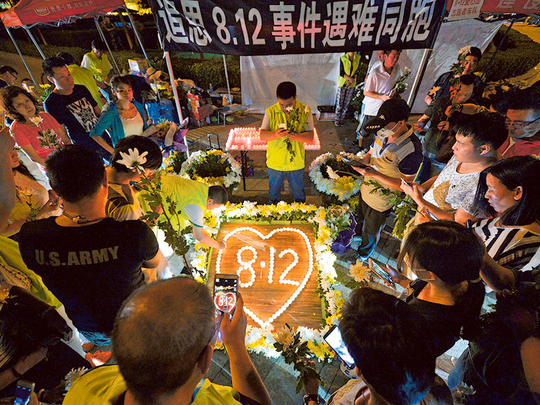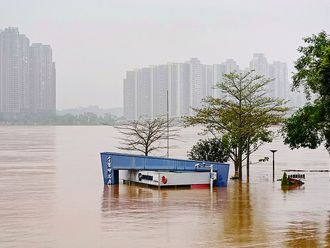
Tianjin, China: Rescue personnel battled to clean up hundreds of tonnes of cyanide at the site of huge explosions in northern China on Monday, as state-run media lambasted officials over their response to the blasts that killed 114.
The August 12 explosions at the hazardous goods storage facility in the port of Tianjin set off a giant fireball, devastated a vast area and raised fears over the impact of toxic pollutants.
The company operating the site had been storing hundreds of tonnes of cyanide, reportedly nearly 30 times the allowed amount, and while officials have insisted that the air and water in the city is safe, residents and victims’ relatives have voiced scepticism.
“Around 700 tonnes” of sodium cyanide was being stored at the warehouse where the blasts took place, He Shusheng, a Tianjin vice-mayor, told a news conference.
The Beijing News, citing storage plans it had seen, said the warehouse was only authorised to hold 24 tonnes of the substance.
A huge, “very complicated and difficult” clean-up was under way on Monday, said He, made harder by the presence of 16,500 empty shipping containers and amid fears forecast rain could release hydrogen cyanide gas.
Authorities had built up sand and earth barriers around the blasts’ 0.1 square kilometre “core area” to prevent any leakage of cyanide or other pollutants, said He.
The closest water test point to the blast site revealed cyanide 27.4 times standards on Sunday, officials said without specifying the quantity, but not beyond the cordoned-off area.
Sodium cyanide had been found as far as around one kilometre (0.6 miles) from the blast site.
Military chemical and nuclear experts have been brought in, as have experts from producers of sodium cyanide — exposure to which can be “rapidly fatal”, according to the US Centres for Disease Control.
Environmental campaign group Greenpeace said on Sunday it had tested surface water for cyanide at four locations in the wider city and had not detected high levels of the chemical.
Officials said on Monday the death toll from the disaster had risen to 114 with 70 people missing, but cautioned that some of those could among the 60 corpses yet to be identified.
Authorities have faced criticism over failing to uphold regulations surrounding the site’s operation, notably requirements that warehouses stocking dangerous materials be at least one kilometre from surrounding public buildings and main roads.
Chinese media reports on Monday said the son of a former police chief of Tianjin port was a major shareholder in the company operating the site, Rui Hai International Logistics.
About a hundred people whose residences were damaged in the massive blasts gathered on Monday for a protest to demand compensation from the government.
“We victims demand: Government, buy back our houses,” said a banner carried by the residents at a protest outside the Tianjin hotel where officials have held daily news conferences about the disaster. “Kids are asking: How can we grow up healthy?” read another banner.
Tianjin officials have been hard-pressed to answer how the warehouse was allowed to operate in its location. Questions also have been raised about management of the warehouse, and the country’s top prosecuting office announced on Sunday that it was setting up a team to investigate possible offences related to the massive blasts, including dereliction of duty and abuse of power. Ruihai’s general manager is in hospital under police watch.
Bian Jiang, a resident of one of the nearby housing complexes, said he was asleep when the first explosion struck last Wednesday night, shortly before midnight.
“Twenty seconds later I heard the second explosion and saw the rising mushroom cloud. Then, I was thrown out of bed by the force of the blast. I was wondering if we would able to get out alive,” he said, adding that his home is now ruined. “All the windows are gone.”












